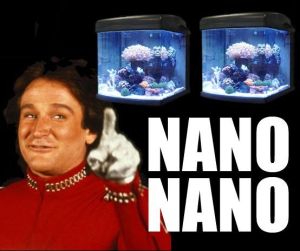
Greatness comes and Greatness goes, but it takes an audience to notice.
Two days ago, I passed the 50,000 word goal on my NaNoWriMo project. Oddly, not even Shazbot celebrated.
The reason I find this odd is because an automated message from the project—a robot, of sorts, whom I like to call ‘Shazbot’—has congratulated me by email on each of the other benchmarks along the way: at 25,000 words, for example, and again at 40,000. Shazbot’s silence over my achievement of NaNo’s ultimate goal is understandable, however, for two simple reasons.
- I haven’t yet finished the novel, and,
- not another human soul has read it.
Perhaps it takes more than just writing 50,000 words for a writer or his ‘bot to feel like celebrating.
To some extent, I think that all writers have a desire to be noticed. I don’t mean that every author craves fame, or is in some other way narcissistic… but when we are writing stories that nobody reads, those stories risk becoming like that proverbial “tree in the forest.” Without an audience, five words or fifty thousand will make exactly the same sound.
This reflexivity—this need to view ourselves through the eyes of an audience—isn’t restricted to the craft of fiction, either, nor even to writing in general. Take the late and legendary Robin Williams (whose famed expression inspired the name for my beloved ‘bot): did he become more funny, more manic, or more empathetic when he upstaged The Fonz in that classic episode of Happy Days? In a way, he possibly did, because a working part of defining what’s ‘funny’ must involve asking how many people are laughing. Williams needed an audience for us to know that he was great.
Sadly, my first shot at NaNo was too focused on trying to create an audience, and that is my fault. When I set out to write Death Imitates Art in the span of a month, I had imagined ‘buddying up’ with several like-minded pounders of the keyboard, swapping chapters across the friendly ether to exchange tips and claps. The website has the social-networking functionality to achieve this, of course, and I imagine that authors friendlier than I have managed to do just that. I think what I missed, though, is that this was never the focus of the NaNoWriMo project; I think the whole point was for us to write prolifically, and to worry later about attracting an audience.
By that standard, I have been very successful, whether Shazbot has noticed or not. During November, I have been less tempted to shop online, watch cartoons, or redesign my technology. I have in excess of 50,000 words, and will have a finished draft on schedule, by Wednesday. I have developed more discipline to just…keep…drafting. While I may not want to show this draft to anyone until my narrator solves her identity crisis, I will still have time to revise my novel and hassle my friend Alison to read it. The earth will continue to orbit after November 30.
And my audience is orbiting somewhere out there, on its surface.
Comments, please: What do you think is an optimal schedule for researching, planning, drafting and editing a novel?
I’ll celebrate for you. Cheers! I’ll stick my finger in a glass of juice and drink it up.
LikeLiked by 1 person
Always leave the glass half-full.
LikeLiked by 1 person
I think you did great. Well done! You kept at it and that is so important. I have learned that finding what is best for you, or what makes you happy is the most important. Write what makes your soul happy. Wishing you well. Sorry I took so long to return the visit.
LikeLike
Nice to see you here! Yes, it was worth the motivation to finish a novel: any novel is better than none.
LikeLike